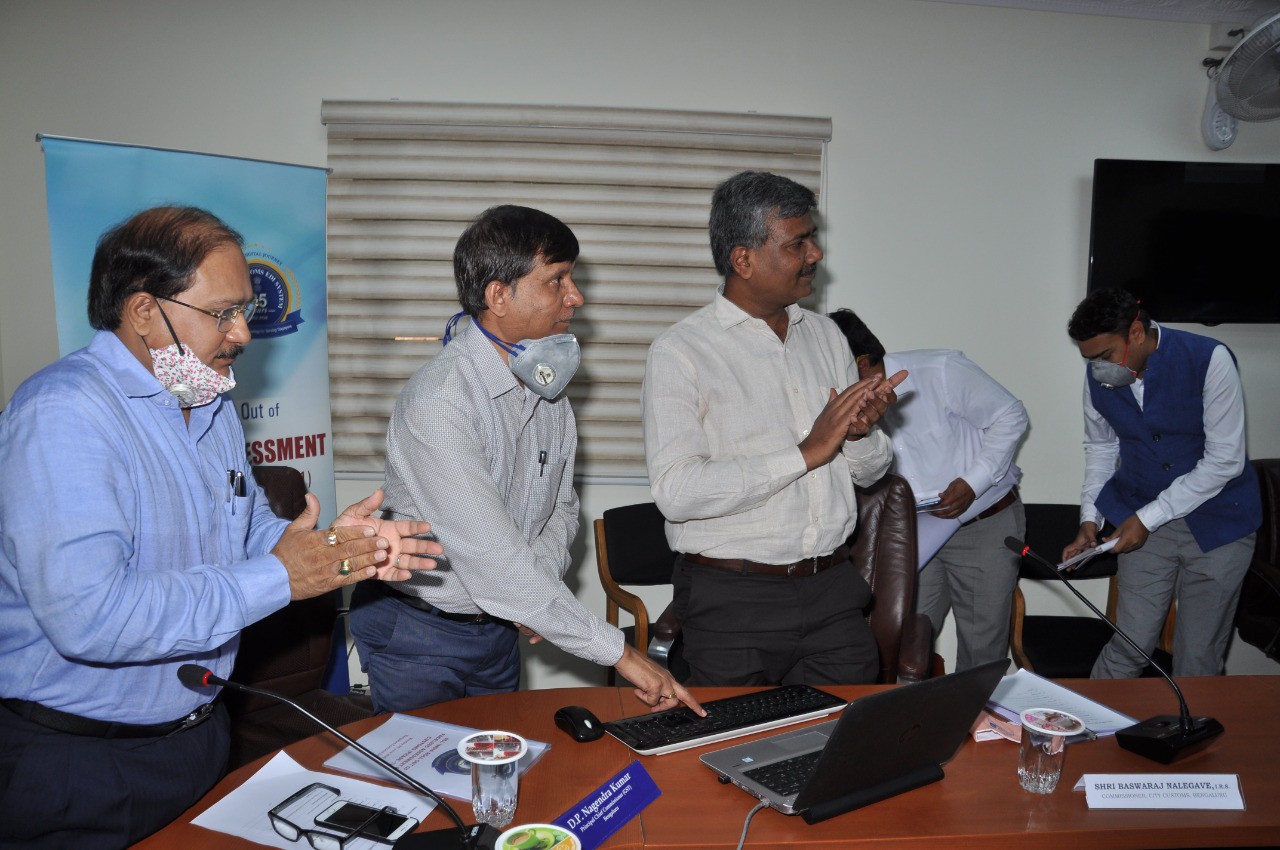
FACELESS ASSESSMENT- Implementation of First Phase of All-India roll-out
Sh. D.P. Nagendra Kumar IRS, Principal Cheif Commissioner of Central GST Karnataka has formally inaugurated the Facelless Assessment Groups (FAGs) and the “Turant Suvidha Kendras”at ACC & ICD , today in a brief fuction , at Customs& Central GST Bhavan in prersence of major importers of Machinery & electronic Goods; and the representatives of the Customs Brokers’ Association of Karnataka. Sh. M. Srinivas, Chief Commissioner of Customs welcomed and delivered key note address. Sh. Ashok Principal Commissioner of Customs AP &ACC , Sh. N. Baswaraj Commissioner of Customs Bengaluru, ShAmitesh Bharath Singh ADG, Taxpayer Services, Sriram ADG Systems and other senior officers o the Customs department, also participated in the function.
2. The Central Board of Customs and Indirect Taxes (CBIC), under the Ministry of Finance, Government of India, has initiated the next-generation reforms in the Customs clearance process under the umbrella of “Turant Customs” scheme (Immediate Customs scheme) with the objectives of speedy clearance, transparency in decision making and ease of doing business.
3. CBIC rolled out numerous changes to the Customs clearance process, which combine together support “Turant Customs”. These initiatives include the self-registration of goods by importers; automated clearances of bills of entry; digitisation of customs documents; paperless clearance by eOOC&eGatepass ; online amendment of BE facility, etc. All these initiatives were extremely useful to ensuremuch needed physicaldistancing, due to COVID19. The stage is now set for rollout of the most critical reform under “TurantCustoms“ i.e:“Faceless Assessment”. The main objective of ‘Faceless Assessment’ is speedy and uniform assessment practices.
4. The first pilot programme of ‘Faceless Assessment’ (at times also referred commonly to as anonymised assessment or virtual assessment) covering articles primarily falling under Chapter 84 of the Customs Tariff Act, 1975, begun in Chennai on 14th August 2019. Similar pilot programmes were subsequently begun in Customs formations in Delhi, Bengaluru, Gujarat and Visakhapatnam. Taking into account the lessons learned from these pilots, a consultation paper was placed in the public domain on 18th February 2020 for further comments and feedback. A large number of user inputs were received in response and these have been taken on board for revising the process flow and modalities for implementing ‘Faceless Assessment’. With experience and success with the pilot programmes, CBIC is now ready to launch ‘Faceless Assessment’ pan India.
5. As ‘Faceless Assessment’ is a complete departure from the existing manner of Customs assessment, CBIC has decided to begin ‘Faceless Assessment’ in phases beginning with Customs stations which already have the experience of the pilot programmes. Therefore, the first phase has begun from 8th June 2020 at Bengaluru and Chennai for items of imports primarily covered by Chapters 84 and 85 of the Customs Tariff Act, 1975. The phased rollout plan envisages that Faceless Assessment shall be the norm pan India by 31st December 2020.
6. In Faceless Assessment, the officers in Faceless Assessment Groups, who are physically located in a particular jurisdiction will assess a Bill of Entry pertaining to imports made at a different Customs station, located in another city, whenever such a Bill of Entry has been assigned to him in the Customs Automated system. Thus, from 8th June 2020, irrespective of whether the goods are imported at any Customs station falling under the jurisdiction of Bengaluru or Chennai Customs Zone, the Bills of Entry pertaining primarily to the said two chapters will be marked by the Customs Automated System to the nominated Faceless Assessment group for assessment. These officers carryout the assessment anonymously with absolutely no physical interaction with the importers/CHAs.
7. There will be one Faceless Assessment Group (FAG) each , with adequate staff, at Air Cargo Complex (ACC)Bengaluru International Airport and ICD,Whitefeild, Bengaluru, to carry on the ‘faceless aseesment’ of imported goods falling under Chapter 84 ( Machinery & parts) and Chapter 85 (Electronic goods) at any Customs Station in Chennai or Bengaluru Zones.
8. In order to facilitate the importers/ Customs Brokers to submit Bonds/ Bank guarentees; register any scheme scrips, carry out any verification of documents, permit licenses etc. the department has set up a “ Turant Suvidha Kendra” (TSK) at ACC & ICD Bengaluru as detailed below:
|
Customs Station / Formation |
Location |
Email id |
Telephone No. |
|
ACC Bangalore [INBLR4] |
3rd Floor, Menzies Aviation Bobba Building, Air cargo complex, Kempegowda International Airport, Devanahalli, Bengaluru. Karnataka – 560 300 |
tsk-accblr@gov.in |
080-27688254 |
|
ICD Whitefeild [INWFD6] |
ICD CONCOR Main Building, Whitefields, Bengaluru-560 066 |
tsk-ccblr@gov.in |
080-28457481 |
9. The Principal Commissionerof Customs, AP & ACC, Bengaluru and the Commissionerof Customs, Bengaluru City Commissionerate as the Nodal officers for the purpose of administratively monitoring the assessment practice followed by the Faceless Assessment Groups in Bengaluru. APublic notice issued in this regard narrating the features and the procedure of this new scheme is placed on www.bangalorecustoms.org.
10. Representatives of importers of Machinery andElectronic Goods; and the representatives of the Customs Brokers’ Association of Karnataka had highly lauded the Faceless assessment falility. They stated that Faceless assessment would ensure uniformity in assessment, Quickness in clearance ,there by reducing the dwell time; minising of the queries by improving the expertise in assessment; and almost eliminates the physical interaction with the representatives of the trade.


.jpeg)

